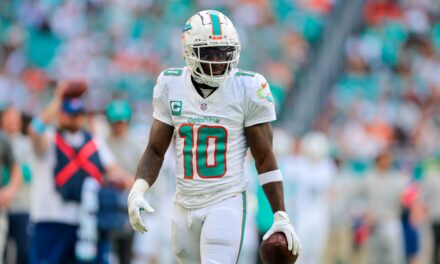We support our Publishers and Content Creators. You can view this story on their website by CLICKING HERE.
The first round of the expanded College Football Playoff should have been a time of celebration for fans of the sport. Instead, it turned into a lecture from ESPN on how the playoff committee didn’t value The Chosen Conference highly enough.
The figurehead for this unfortunate turn of events was Kirk Herbstreit, a generally well-liked and well-respected analyst who has become one of the key voices in college football. But Herbstreit and several other ESPN-associated commentators, like Paul Finebaum, spent the first round engaging in hypocrisy, revisionist history, and SEC-worship. To the great detriment of the product that they helped create.
Herbstreit went off on Indiana on College GameDay, saying they didn’t deserve to be on the same field as Notre Dame. Then was curiously silent about the Tennessee Volunteers, who got obliterated by Ohio State despite taking their shirts off pregame and bringing thousands of fans to Columbus.
READ: Tennessee Takes The “No Shirts For Cold Weather Warmups” Approach Ahead Of CFP Clash With Ohio State
Indiana lost 27-17 on the road, averaging 4.6 yards per play against one of the toughest defenses in the country. Tennessee lost 42-17 on the road, averaging 3.7 yards per play against one of the toughest defenses in the country. Which one was more deserving or better than the other?
But Herbstreit doubled down the next day, going on “The Pat McAfee Show” to talk about finding the “best 12 or the most deserving 12.”
It got worse in a video posted by Linda Cohn, in which Herbstreit said that the committee shouldn’t be focused on “wins” to pick the playoff teams.
And this is why ESPN’s partnership with the SEC is bad for college football.

ATLANTA, GA – DECEMBER 07: Kirk Herbstreit at ESPN College Game Day during a game between Georgia Bulldogs and LSU Tigers at Mercedes Benz Stadium on December 7, 2019 in Atlanta, Georgia. (Photo by Steve Limentani/ISI Photos/Getty Images)
ESPN’s Standards Suddenly Change For SEC
The entire debate over the inclusion of Alabama and Ole Miss, who conclusively did not belong in the college football playoff in 2024, boils down to the fact that SEC fans are happy to choose whichever metric or standard makes their teams look better. That’s fine, that’s how fans are. But media observers are supposed to be more objective. ESPN’s aren’t.
In 2017, when 11-1 Alabama got into the CFB Playoff over 10-2 Ohio State, Herbstreit said “The losses matter. To lose the way [Ohio State] lost [to Iowa], it sent a message the committee couldn’t forget.”
When it benefited Alabama and by extension, ESPN, Herbstreit said losses matter. This year, he says on ESPN that just because you win 11 games, you might not be better than a team that only had 9 wins. Well, well, well, how the turn tables.
This is the problem: the SEC is already treated like college football’s golden child because it generally has the biggest fan bases and because Alabama and Georgia have dominated the sport for much of the last decade. That doesn’t mean that the 2024 version of Alabama, or the 2024 version of Tennessee are suddenly better or more deserving because of what Nick Saban’s team did in 2017. Yet that’s how ESPN employees act, because it’s in their financial best interest to do so.
Tennessee did deserve to be in the college football playoff. So did Indiana. Alabama did not. Ole Miss did not. Despite the SEC’s undefeated record in hypothetical matchups, in the games that actually did happen, Alabama got blown out by a bad Oklahoma team, and lost to literally Vanderbilt. Ole Miss lost to 4-8 Kentucky. They beat Georgia and South Carolina and had seven other unimpressive wins. The two extra losses from Ole Miss get tossed out because of two good wins, apparently. Not to mention that Indiana’s strength of schedule was, per ESPN’s own FPI, 32nd this year, ahead of No. 36 Ole Miss. Alabama was 22nd, not that much harder than Indiana.
ESPN promoting one conference ahead of the others is bad, because ESPN still has immense power and influence. And next year, if a 10-2 SEC team with an easy schedule gets in over a 9-3 Big Ten team with a harder schedule, they’ll go right back to saying that having more wins matters over having more losses in a (debatable) tougher schedule. But will future committees be influenced by having the biggest public voices demanding more SEC representation based on their own wildly different standards?
The standards are not consistent, the comments are not consistent. But ESPN’s campaigning for one conference over others certainly is.

 Conservative
Conservative  Search
Search Trending
Trending Current News
Current News 





